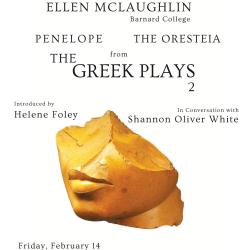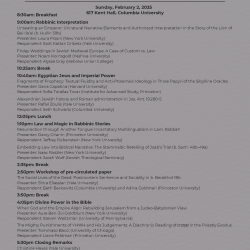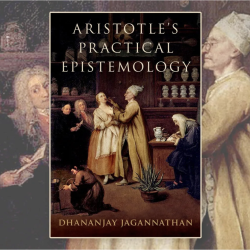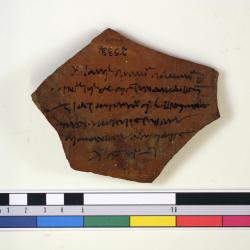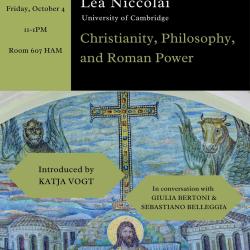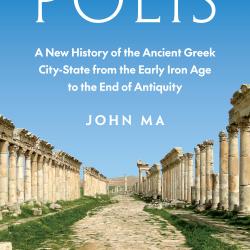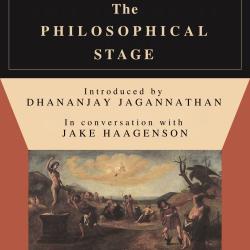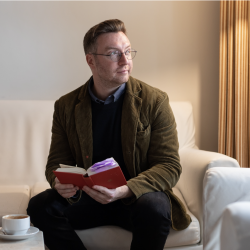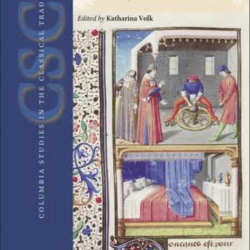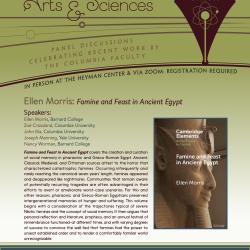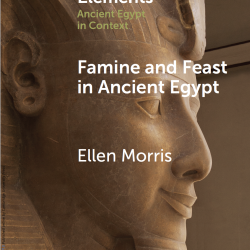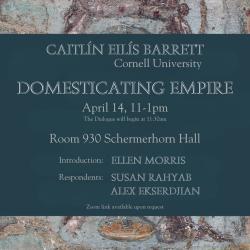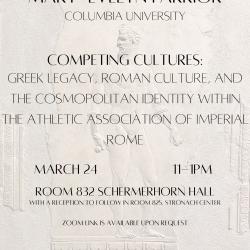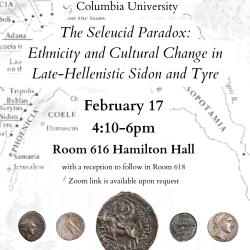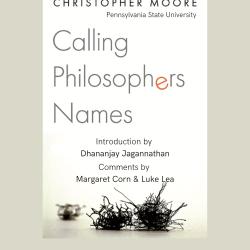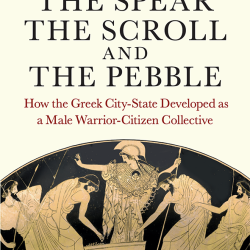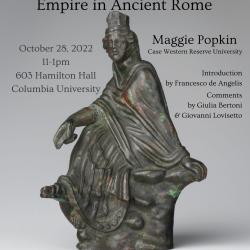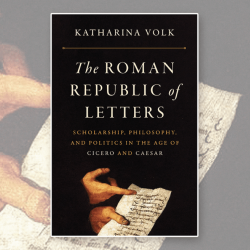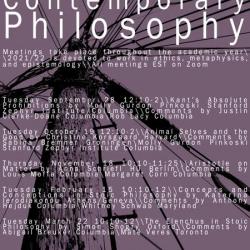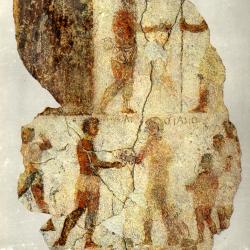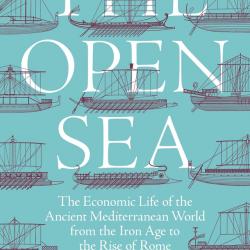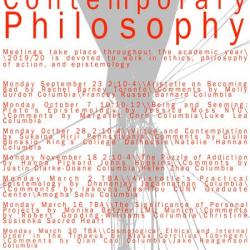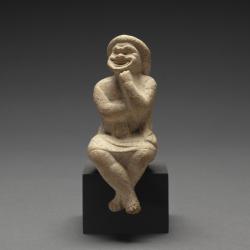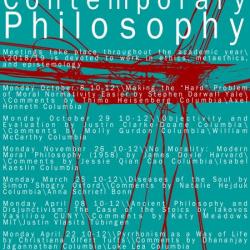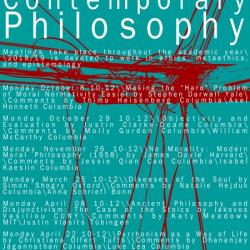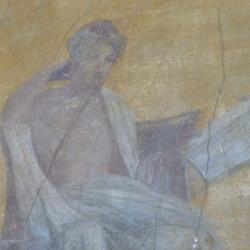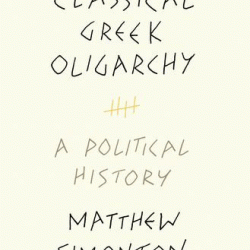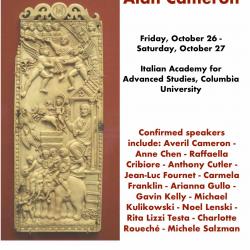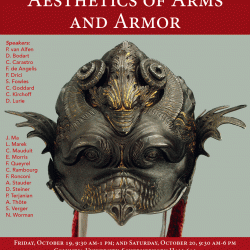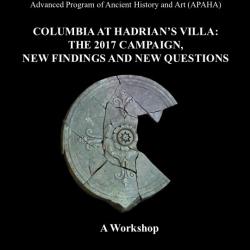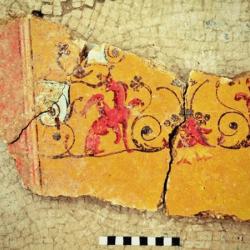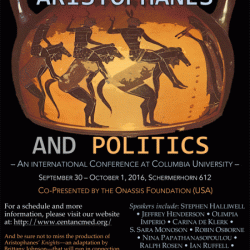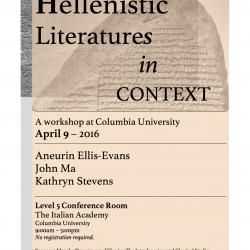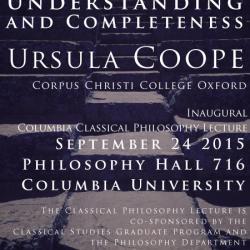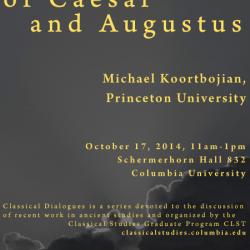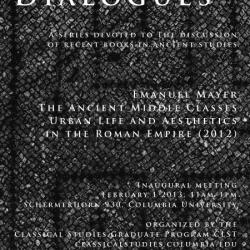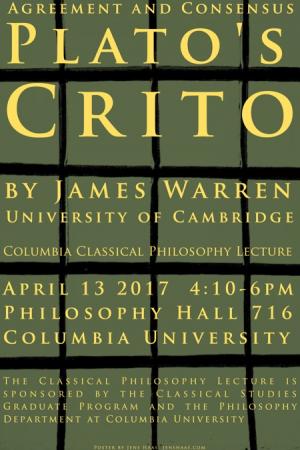Crito thinks Socrates should agree to leave the prison and escape from Athens. Socrates is also determined that he and Crito should have a ‘common plan of action’ (koinē boulē: 49d3), but he wants Crito to share his preferred plan of remaining and submitting to the court’s sentence. Much of the drama of the Crito is generated by the interplay of these two old friends, both determined that they should come to an agreement, but differing radically in what they think the two of them should agree to do. I show how agreements of various kinds—including agreements about how to agree—play important roles in the dialogue. What is more, attention to that theme may help to explain one of the most pressing questions for any interpretation of the Crito. Why does Socrates choose, at the end of the dialogue, to present to Crito a speech in the voice of the personified laws of Athens?
Agreement and Consensus in Plato’s Crito
What's Happening
Friday, October 17, 2025
Classical Dialogue
Aristotle on Grief and Grieving with Friends
Patricia Marechal
University of California, San Diego
Friday, October 17, 2025
Friday, October 17, 2025
Hamilton 607
more >>
Tuesday, September 9, 2025
Announcement
MARY-EVELYN FARRIOR APPOINTED LECTURER IN CLASSICS AT PRINCETON UNIVERSITY
Tuesday, September 9, 2025
Tuesday, September 9, 2025
more >>
Tuesday, May 6, 2025
Announcement
Luke Lea Appointed Assistant Professor in Cultures, Civilizations, and Ideas Program at Bilkent University
Tuesday, May 6, 2025
Tuesday, May 6, 2025
more >>
Friday, May 2, 2025
Announcement
Mariana Beatriz Noé Appointed Assistant Professor in the Department of Philosophy at the University of Arizona
Friday, May 2, 2025
Friday, May 2, 2025
more >>
Thursday, May 1, 2025
Announcement
Katherine Stitt Competes in GSAS Master's SynThesis
Thursday, May 1, 2025
Thursday, May 1, 2025
more >>
Monday, April 28, 2025
Announcement
CLST Alumnus Matthew Bogdanos Receives GSAS Dean’s Distinguished Alumni Award
Monday, April 28, 2025
Monday, April 28, 2025
more >>
Wednesday, April 16, 2025
Announcement
Francesco Cassini Appointed Lecturer in Roman History at UCL
Wednesday, April 16, 2025
Wednesday, April 16, 2025
more >>
Friday, April 4, 2025
Event
The Barnard/Columbia Ancient Drama Group Presents Sophocles’ Oedipus at Colonus
Friday, April 4, 2025
Friday, April 4, 2025
Minor Latham Playhouse
more >>
Tuesday, April 1, 2025
Announcement
Abigail Breuker Appointed Assistant Professor in the Department of Philosophy at the University of South Carolina
Tuesday, April 1, 2025
Tuesday, April 1, 2025
more >>
Thursday, March 13, 2025
Lecture
Defining cloth-gestures in Greek and Roman Art
Giulia Bertoni
Columbia University
Thursday, March 13, 2025
Thursday, March 13, 2025
Schermerhorn 806
more >>
Friday, March 7, 2025
Classical Dialogue
The Ancient Shore
Paul Kosmin
Harvard University
Friday, March 7, 2025
Friday, March 7, 2025
Hamilton 603
more >>
Friday, February 14, 2025
Classical Dialogue
The Greek Plays 2: Penelope and The Oresteia
Ellen McLaughlin
Barnard College
Friday, February 14, 2025
Friday, February 14, 2025
223 Milbank Hall
more >>
Sunday, February 2, 2025
Conference
Ancient Judaism Regional Seminar 2025
Sunday, February 2, 2025
Sunday, February 2, 2025
Kent 617
more >>
Monday, January 27, 2025
Announcement
Celebrating Recent Work by Dhananjay Jagannathan
Monday, January 27, 2025
Monday, January 27, 2025
more >>
Wednesday, January 15, 2025
Announcement
CLST Doctoral Candidate Susan Rahyab Publishes Article in Bulletin of the American Society of Papyrologists
Wednesday, January 15, 2025
Wednesday, January 15, 2025
more >>
Sunday, December 15, 2024
Announcement
CLST MA Alumni Reflect on their Time at Columbia
Sunday, December 15, 2024
Sunday, December 15, 2024
more >>
Friday, November 8, 2024
Classical Dialogue
Babylonian Jews and Sasanian Imperialism in Late Antiquity
Simcha Gross
University of Pennsylvania
Friday, November 8, 2024
Friday, November 8, 2024
607 HAM
more >>
Friday, October 4, 2024
Classical Dialogue
Christianity, Philosophy, and Roman Power: Constantine, Julian, and the Bishops on Exegesis and Empire
Lea Niccolai
University of Cambridge
Friday, October 4, 2024
Friday, October 4, 2024
Hamilton 607
more >>
Wednesday, September 18, 2024
Announcement
CLST Faculty John Ma Publishes New Book: "Polis: A New History of the Ancient Greek City-State from the Early Iron Age to the End of Antiquity"
Wednesday, September 18, 2024
Wednesday, September 18, 2024
more >>
Thursday, September 5, 2024
Announcement
Congratulations to Mary-Evelyn Farrior on Successfully Defending her Dissertation!
Thursday, September 5, 2024
Thursday, September 5, 2024
more >>
Thursday, July 11, 2024
Announcement
Congratulations to Giovanni Lovisetto on Successfully Defending his Dissertation!
Thursday, July 11, 2024
Thursday, July 11, 2024
more >>
Friday, April 5, 2024
Classical Dialogue
The Philosophical Stage: Drama and Dialectic in Classical Athens
Joshua Billings
Princeton University
Friday, April 5, 2024
Friday, April 5, 2024
Hamilton 607
more >>
Friday, March 29, 2024
Event
The Barnard/Columbia Ancient Drama Group presents Mangled House
Friday, March 29, 2024
Friday, March 29, 2024
Minor Latham Playhouse
more >>
Friday, February 23, 2024
Classical Dialogue
Pindar, Song, and Space: Towards a Lyric Archaeology
Richard Neer and Leslie Kurke
The University of Chicago and University of California, Berkeley
Friday, February 23, 2024
Friday, February 23, 2024
Hamilton 603
more >>
Thursday, February 1, 2024
Announcement
CLST Alum Evan Jewell Appointed Classical Summer School Director
Thursday, February 1, 2024
Thursday, February 1, 2024
more >>
Tuesday, January 16, 2024
Announcement
CLST Faculty Katharina Volk Publishes in and Edits the Collection 'Nigidius Figulus: Roman Polymath'
Tuesday, January 16, 2024
Tuesday, January 16, 2024
more >>
Friday, December 15, 2023
Announcement
CLST Doctoral Candidate Ayelet Wenger Publishes Article in the Jewish Quarterly Review
Friday, December 15, 2023
Friday, December 15, 2023
more >>
Friday, December 8, 2023
Announcement
CLST Doctoral Candidate Susan Rahyab Publishes Chapter in Brill Studies in Greek and Roman Epigraphy
Friday, December 8, 2023
Friday, December 8, 2023
more >>
Friday, November 10, 2023
Classical Dialogue
Phoenicians among Others: Why Migrants Mattered in the Ancient Mediterranean
Denise Demetriou
University of California, San Diego
Friday, November 10, 2023
Friday, November 10, 2023
Hamilton 509
more >>
Tuesday, October 10, 2023
Event
Celebrating Recent Work by Ellen Morris
Tuesday, October 10, 2023
Tuesday, October 10, 2023
Heyman Center
more >>
Friday, October 6, 2023
Classical Dialogue
In Blood and Ashes: Curse Tablets and Binding Spells in Ancient Greece
Jessica Lamont
Yale University
Friday, October 6, 2023
Friday, October 6, 2023
Hamilton 509
more >>
Monday, July 10, 2023
Announcement
CLST Chair Dr. Ellen Morris Publishes New Book: "Famine and Feast in Ancient Egypt"
Monday, July 10, 2023
Monday, July 10, 2023
more >>
Wednesday, June 7, 2023
Conference
Italics: Italian poetry in America
Wednesday, June 7, 2023
Wednesday, June 7, 2023
The Italian Academy for Advanced Studies, Columbia University
more >>
Wednesday, May 17, 2023
Announcement
Congratulations to the Class of 2023!
Wednesday, May 17, 2023
Wednesday, May 17, 2023
more >>
Monday, May 15, 2023
Announcement
Abigail Breuker Awarded SWIP-NYC Graduate Essay Prize
Monday, May 15, 2023
Monday, May 15, 2023
more >>
Friday, April 28, 2023
Conference
A Roman World? Imperial Power and Provincial Communities
Friday, April 28, 2023
Friday, April 28, 2023
The Italian Academy for Advanced Studies, Columbia University
more >>
Tuesday, April 25, 2023
Announcement
Mary-Evelyn Farrior Awarded Rome Prize
Tuesday, April 25, 2023
Tuesday, April 25, 2023
more >>
Friday, April 21, 2023
Event
Lodge Papyrology Fellowship Publication Party
Friday, April 21, 2023
Friday, April 21, 2023
RBML at Butler Library
more >>
Friday, April 14, 2023
Classical Dialogue
Domesticating Empire
Caitlín Eilís Barrett
Cornell University
Friday, April 14, 2023
Friday, April 14, 2023
930 Schermerhorn
more >>
Friday, March 24, 2023
Lecture
Competing Cultures: Greek Legacy, Roman Culture, and the Cosmopolitan Identity within the Athletic Association of Imperial Rome
Mary-Evelyn Farrior
Columbia University
Friday, March 24, 2023
Friday, March 24, 2023
832 Schermerhorn
more >>
Friday, February 17, 2023
Lecture
The Seleucid Paradox: Ethnicity and Cultural Change in Late-Hellenistic Sidon and Tyre
Tal Ish-Shalom
Columbia University
Friday, February 17, 2023
Friday, February 17, 2023
616 Hamilton
more >>
Friday, February 3, 2023
Classical Dialogue
Calling Philosophers Names
Christopher Moore
Pennsylvania State University
Friday, February 3, 2023
Friday, February 3, 2023
832 Schermerhorn
more >>
Tuesday, January 10, 2023
Announcement
CLST Faculty Richard A. Billows Publishes New Book: 'The Spear, The Scroll, and The Pebble'
Tuesday, January 10, 2023
Tuesday, January 10, 2023
more >>
Friday, November 18, 2022
Classical Dialogue
Scale, Space and Canon in Ancient Literary Culture
Reviel Netz
Stanford University
Friday, November 18, 2022
Friday, November 18, 2022
507 Hamilton
more >>
Friday, October 28, 2022
Classical Dialogue
Souvenirs and the Experience of Empire in Ancient Rome
Maggie Popkin
Case Western Reserve University
Friday, October 28, 2022
Friday, October 28, 2022
more >>
Tuesday, October 4, 2022
Announcement
CLST MA CANDIDATE JORDI ALONSO IS A FEATURED POET IN THE BANYAN REVIEW
Tuesday, October 4, 2022
Tuesday, October 4, 2022
more >>
Monday, September 19, 2022
Announcement
PROFESSORS DEBBIE STEINER & KATHARINA VOLK WIN GOODWIN AWARD
Monday, September 19, 2022
Monday, September 19, 2022
more >>
Friday, May 6, 2022
Announcement
CLST Alum Evan Jewell awarded Rome Prize
Friday, May 6, 2022
Friday, May 6, 2022
more >>
Wednesday, April 20, 2022
Announcement
CLST DIRECTOR OF GRADUATE STUDIES DR. JOSEPH HOWLEY AWARDED THE 2022 COLUMBIA UNIVERSITY FACULTY MENTORING AWARD
Wednesday, April 20, 2022
Wednesday, April 20, 2022
more >>
Thursday, December 2, 2021
Event
Heyman Center: Celebrating Recent Work by Katharina Volk
Thursday, December 2, 2021
Thursday, December 2, 2021
The Heyman Center for Humanities, Second Floor Common Room, Columbia University, 74 Morningside Drive New York, NY, 10027United States
more >>
Thursday, November 18, 2021
Workshop
Why does Aristotle ascribe a notion of matter to his predecessors? On matter in Metaphysics A
Thursday, November 18, 2021
Thursday, November 18, 2021
Zoom
more >>
Monday, September 13, 2021
Announcement
CLST DOCTORAL CANDIDATE TAL ISH-SHALOM PUBLISHES ARTICLE IN THE JOURNAL OF ROMAN STUDIES
Monday, September 13, 2021
Monday, September 13, 2021
more >>
Friday, April 16, 2021
Classical Dialogue
The Early Roman Expansion into Italy
Nicola Terrenato
University of Michigan at Ann Arbor
Friday, April 16, 2021
Friday, April 16, 2021
Virtual Event: Zoom
more >>
Friday, October 30, 2020
Classical Dialogue
Void and Space in the Thought of the Presocratics, Plato, and Aristotle
Barbara Sattler
Ruhr-Universität Bochum
Friday, October 30, 2020
Friday, October 30, 2020
Virtual Event: Zoom
more >>
Friday, June 19, 2020
Friday, March 6, 2020
Workshop
CLST Placement Workshop
Friday, March 6, 2020
Friday, March 6, 2020
Schermerhorn 930
more >>
Friday, November 15, 2019
Classical Dialogue
Two questions about the rule of Law in Plato
Susan Sauvé Meyer
University of Pennsylvania
Friday, November 15, 2019
Friday, November 15, 2019
Schermerhorn 807
more >>
Friday, October 18, 2019
Classical Dialogue
The Open Sea
Joseph Manning
Yale University
Friday, October 18, 2019
Friday, October 18, 2019
Schermerhorn 807
more >>
Monday, October 7, 2019
Workshop
Being and Seeming: Plato’s Epistemology
Monday, October 7, 2019
Monday, October 7, 2019
Philosophy Hall 716
more >>
Thursday, September 26, 2019
Announcement
CLST Photo Contest: Call for Submissions
Thursday, September 26, 2019
Thursday, September 26, 2019
more >>
Thursday, August 29, 2019
Announcement
CLST STUDENT MENTORING PROGRAM: 2019-20 MENTORS SELECTED
Thursday, August 29, 2019
Thursday, August 29, 2019
more >>
Sunday, May 26, 2019
Friday, April 26, 2019
Classical Dialogue
Plautus and Popular Comedy
Amy Richlin
UCLA
Friday, April 26, 2019
Friday, April 26, 2019
Schermerhorn 807
more >>
Monday, April 22, 2019
Workshop
Workshop in Ancient and Contemporary Philosophy: Pyrrhonian Skepticism as a Way of Life
Monday, April 22, 2019
Monday, April 22, 2019
Philosophy Hall 716
more >>
Friday, April 19, 2019
Workshop
Margarete Bieber Reading Group
Friday, April 19, 2019
Friday, April 19, 2019
Schermerhorn 930
more >>
Thursday, April 18, 2019
Lecture
USem in Classical Civilization: Campbell Grey
Campbell Grey
University of Pennsylvania
Thursday, April 18, 2019
Thursday, April 18, 2019
more >>
Tuesday, April 9, 2019
Announcement
Jeremy Simmons Awarded Rome Prize
Tuesday, April 9, 2019
Tuesday, April 9, 2019
more >>
Monday, March 25, 2019
Lecture
Workshop in Ancient and Contemporary Philosophy: Vicious Character Traits as Rational Mistakes
Simon Shogry
University of Oxford
Monday, March 25, 2019
Monday, March 25, 2019
Philosophy Hall 716
more >>
Friday, March 1, 2019
Classical Dialogue
The Journey of Christianity to India in Late Antiquity
Nathanael Andrade
Binghamton University
Friday, March 1, 2019
Friday, March 1, 2019
Schermerhorn 930
more >>
Friday, February 8, 2019
Announcement
Alice Sharpless Awarded the Bothmer Fellowship at the Metropolitan Museum of Art
Friday, February 8, 2019
Friday, February 8, 2019
more >>
Friday, December 14, 2018
Announcement
Application Deadline for PhD Admissions
Friday, December 14, 2018
Friday, December 14, 2018
more >>
Friday, November 9, 2018
Classical Dialogue
Classical Greek Oligarchy
Matthew Simonton
Arizona State University
Friday, November 9, 2018
Friday, November 9, 2018
Schermerhorn 934
more >>
Friday, October 26, 2018
Conference
Conference in Memory of Alan Cameron
Friday, October 26, 2018
Friday, October 26, 2018
Italian Academy, 3rd Floor
more >>
Friday, October 19, 2018
Workshop
Ways of Seeing, Ways of Reading II: The Anthropology and Aesthetics of Arms and Armor
Friday, October 19, 2018
Friday, October 19, 2018
Schermerhorn Hall, 612
more >>
Friday, September 28, 2018
Classical Dialogue
Ancient Eudaimonism and Modern Morality
Julia Annas
University of Arizona
Friday, September 28, 2018
Friday, September 28, 2018
Schermerhorn 807
more >>
Thursday, August 30, 2018
Announcement
CLST Student Mentoring Program: 2018-19 Mentors Selected
Thursday, August 30, 2018
Thursday, August 30, 2018
more >>
Thursday, June 28, 2018
Workshop
Munich New York City Workshop in Ethics
Thursday, June 28, 2018
Thursday, June 28, 2018
more >>
Wednesday, April 25, 2018
Announcement
Evan Jewell Awarded Mellon International Travel Fellowship
Wednesday, April 25, 2018
Wednesday, April 25, 2018
more >>
Monday, April 23, 2018
Lecture
Columbia at Hadrian’s Villa: The 2017 Campaign
Monday, April 23, 2018
Monday, April 23, 2018
Schermerhorn Hall 612
more >>
Friday, April 13, 2018
Classical Dialogue
Virgilian Geopoetics, or the Emotional Science of Geography
Alessandro Barchiesi
New York University
Friday, April 13, 2018
Friday, April 13, 2018
Schermerhorn Hall 934
more >>
Tuesday, April 10, 2018
Announcement
Jeremy Simmons Awarded AIIS and SSRC Fellowships
Tuesday, April 10, 2018
Tuesday, April 10, 2018
more >>
Thursday, April 5, 2018
Announcement
Mariana Noé Receives 2018 Presidential Teaching Award
Thursday, April 5, 2018
Thursday, April 5, 2018
more >>
Friday, March 23, 2018
Workshop
Classical Studies Dissertation Workshop
Friday, March 23, 2018
Friday, March 23, 2018
Schermerhorn 930
more >>
Friday, March 2, 2018
Classical Dialogue
Office and Rule in Constitutional Change
Melissa Lane
Princeton University
Friday, March 2, 2018
Friday, March 2, 2018
Schermerhorn Hall 934
more >>
Saturday, December 9, 2017
Conference
The Creation of Roman History and Epigraphy: Theodor Mommsen from 1817 to 2017
Saturday, December 9, 2017
Saturday, December 9, 2017
Italian Academy, 5th Floor, Columbia University
more >>
Friday, November 17, 2017
Classical Dialogue
Tyrannicide in Ancient Greece
David Teegarden
SUNY Buffalo
Friday, November 17, 2017
Friday, November 17, 2017
Schermerhorn Hall 930
more >>
Friday, October 20, 2017
Classical Dialogue
The Beginnings of Latin Literature
Denis Feeney
Princeton University
Friday, October 20, 2017
Friday, October 20, 2017
Schermerhorn Hall 930
more >>
Monday, June 5, 2017
Announcement
Giulia Bonasio Awarded Chateaubriand Fellowship
Monday, June 5, 2017
Monday, June 5, 2017
more >>
Friday, March 24, 2017
Classical Dialogue
Human and Animal Bodies in Ancient Greece
Annetta Alexandridis
Cornell University
Friday, March 24, 2017
Friday, March 24, 2017
930 Schermerhorn
more >>
Thursday, February 23, 2017
Lecture
Columbia University at Hadrian’s Villa: The 2016 Archaeological Campaign
Thursday, February 23, 2017
Thursday, February 23, 2017
Italian Academy
more >>
Friday, November 11, 2016
Conference
Refuge and Refugees in the Ancient World
Friday, November 11, 2016
Friday, November 11, 2016
Italian Academy, 5th Floor, Columbia University
more >>
Friday, October 28, 2016
Conference
Epistemology After Sextus Empiricus
Friday, October 28, 2016
Friday, October 28, 2016
Philosophy Hall 716, Columbia University
more >>
Friday, October 28, 2016
Classical Dialogue
Networks Colonization, and Regional Hybridity
Irad Malkin
Tel Aviv University
Friday, October 28, 2016
Friday, October 28, 2016
Schermerhorn Hall 930
more >>
Friday, September 30, 2016
Friday, April 15, 2016
Classical Dialogue
Two Classic Problems in the Stoic Theory of Time
Ricardo Salles
Universidad Nacional Autónoma de México
Friday, April 15, 2016
Friday, April 15, 2016
more >>
Saturday, April 9, 2016
Workshop
Hellenistic Literatures in Context
Saturday, April 9, 2016
Saturday, April 9, 2016
Italian Academy, 5th Floor, Columbia University
more >>
Friday, February 19, 2016
Classical Dialogue
Stoics and Skeptics on Cataleptic Impressions
Tobias Reinhardt
Corpus Christi College, Oxford
Friday, February 19, 2016
Friday, February 19, 2016
Schermerhorn Hall 934
more >>
Friday, December 4, 2015
Classical Dialogue
Killing Mummies: On Inka Epistemology and Imperial Power
Terence D’Altroy
Columbia University
Friday, December 4, 2015
Friday, December 4, 2015
Schermerhorn Hall 934
more >>
Friday, November 13, 2015
Lecture
Columbia's Archaeological Campaign at Hadrian's Villa (APAHA Tibur 2015)
Friday, November 13, 2015
Friday, November 13, 2015
Schermerhorn Hall 612
more >>
Thursday, September 24, 2015
Lecture
Inaugural Classical Philosophy Lecture: Aristotle on Productive Understanding and Completeness, by Ursula Coope, Corpus Christi College Oxford
Professor Ursula Coope
Thursday, September 24, 2015
Thursday, September 24, 2015
Philosophy Hall 716, Columbia University
more >>
Sunday, August 30, 2015
Event
Columbia Classical Studies Photo Award 2015
Sunday, August 30, 2015
Sunday, August 30, 2015
more >>
Friday, August 14, 2015
Announcement
Giulia Bonasio Awarded DAAD Fellowship
Friday, August 14, 2015
Friday, August 14, 2015
more >>
Friday, April 10, 2015
Classical Dialogue
Tombs and Burial Customs in Third-Century CE Rome
Barbara Borg
University of Exeter
Friday, April 10, 2015
Friday, April 10, 2015
Schermerhorn Hall 930
more >>
Wednesday, March 4, 2015
Classical Dialogue
Natural Character
Mariska Leunissen
Chapel Hill
Wednesday, March 4, 2015
Wednesday, March 4, 2015
Hamilton Hall 603
more >>
Friday, October 17, 2014
Classical Dialogue
The Divinization of Caesar and Augustus
Michael Koortbojian
Princeton University
Friday, October 17, 2014
Friday, October 17, 2014
Schermerhorn Hall 832
more >>
Friday, March 14, 2014
Classical Dialogue
Miskawayh on Pleasures and Pains
Peter Adamson
Ludwig Maximilian University
Friday, March 14, 2014
Friday, March 14, 2014
716 Philosophy Hall
more >>
Friday, March 7, 2014
Classical Dialogue
Ancient Theories of Color
Katerina Ierodiakonou
Athens and Geneva
Friday, March 7, 2014
Friday, March 7, 2014
716 Philosophy Hall
more >>
Friday, April 19, 2013
Workshop
Technology and Skills Workshop II: Researching Ancient Places
Friday, April 19, 2013
Friday, April 19, 2013
more >>
Friday, February 1, 2013
Classical Dialogue
The Ancient Middle Classes
Emanuel Mayer
University of Chicago
Friday, February 1, 2013
Friday, February 1, 2013
Schermerhorn Hall 930
more >>
Monday, June 18, 2012
Thursday, March 8, 2012
Friday, September 9, 2011
Conference
The Many Worlds of the Odyssey
Friday, September 9, 2011
Friday, September 9, 2011
Philosophy Hall 716, Columbia University
more >>











